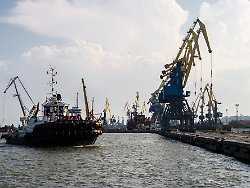Also consequences for commodity markets
The Ukrainian economy is threatened with a dramatic slump
03/14/2022, 6:48 p.m
Even a quick end to the war can’t change anything: According to a forecast by the International Monetary Fund, the Ukrainian economy will collapse dramatically as a result of Russia’s war. The organization also warns of a global food crisis.
The government is still functioning, the banking system is stable and debts can be paid off, at least in the short term. But the Russian attack on Ukraine could collapse the country’s economy, the International Monetary Fund (IMF) said. The organization also warned of far-reaching consequences for the global commodity markets. The war threatens global food security, and certain crops, especially wheat, cannot be grown.
Even if the war were to end quickly, the country’s production would fall by ten percent, the IMF predicted. However, the organization also warned of “massive uncertainties” in the forecasts – the situation could deteriorate significantly in the event of a prolonged war. Looking at data from other conflicts, for example in Iraq, Lebanon, Syria and Yemen, the IMF warned of significantly higher economic losses of 25 to 30 percent.
In 2021, the Ukrainian economy grew by 3.2 percent due to a record wheat harvest and high consumer spending. However, the Russian attack has “dramatically changed” the economic situation in Ukraine, the IMF said. As of March 6, 202 schools, 34 hospitals, more than 1,500 houses, dozens of kilometers of roads and “countless” objects of critical infrastructure had been destroyed in Ukraine. Ports and airports were also closed due to “massive destruction”. In addition to the damage in Ukraine, the IMF warned of the effects of the war on other countries. Since the beginning of the war, the prices for energy and agricultural goods have increased significantly.
“War in Ukraine means hunger in Africa”
In a report, the IMF warned of further price increases and the resulting additional inflationary pressure. “A disruption in agricultural activities in the spring could lead to lower exports and growth and threaten food security,” the report said. First, this will make itself felt in rising prices. However, a long-lasting conflict could also jeopardize supplies – if farmers are unable to grow the necessary crops due to the war.
“War in Ukraine means hunger in Africa,” warned IMF chief Kristalina Georgieva in an interview with CBS on Sunday. The United Nations World Food Program (WFP) also recently warned that export disruptions would have “immediate impact” on countries like Egypt, which are heavily dependent on grain imports from Russia and Ukraine. Countries like Afghanistan, Ethiopia, Syria and Yemen are also badly affected.
